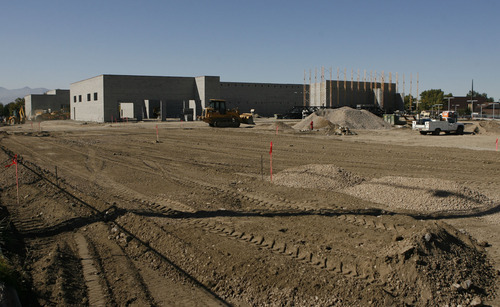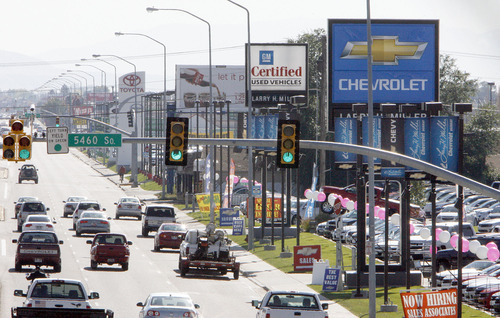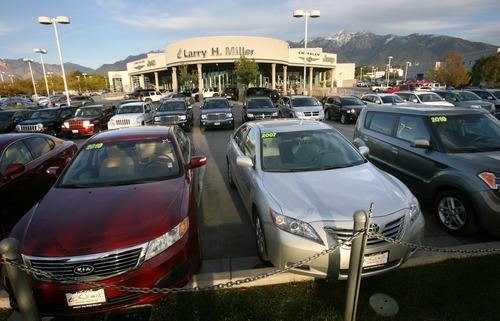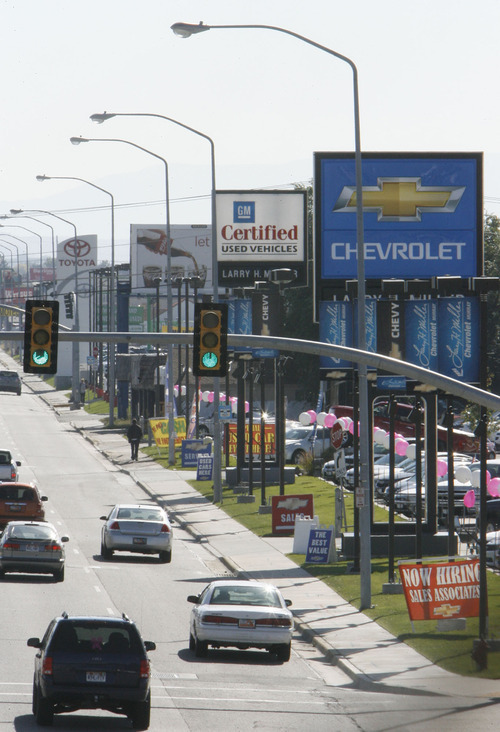This is an archived article that was published on sltrib.com in 2011, and information in the article may be outdated. It is provided only for personal research purposes and may not be reprinted.
Being the parent company of the Utah Jazz gives the Larry H. Miller Group of Companies sex appeal.
But selling cars, sports team merchandise, more cars, movie tickets and still more cars is what has made the company a leading figure in Utah's business community for three decades and one of the state's top employers.
Like everybody else, LHM sustained body blows during the Great Recession, forcing its executives to look hard at the business's core operations. Tough measures were taken to keep the diversified company moving forward. In the end, the Miller Group emerged from the recession a lean, money-making machine.
For example:
• Last year, the 43 dealerships in the automotive division generated $2.5 billion in gross revenue, $500 million more than the cost of the 2002 Winter Olympics. Two more dealerships were added this year.
• Fanzz, the company's sports-apparel retail chain, expanded into the Midwest with seven new stores. By Thanksgiving, 73 stores will be in operation.
• The latest Megaplex Theatre complex opened Oct. 14 in Centerville, the sixth between Ogden and Lehi.
• LHM's in-house advertising agency, Saxton/ Horne, has tripled its business the past three years and increased staff from 23 to 62.
• Subsidiary Prestige Financial Services gained access to an additional $150 million in funding this spring from Wells Fargo Securities, easing efforts to help customers buy vehicles at 700 dealerships in 25 states — most not part of the Miller Group.
• The company also retired considerable debt early, leaving it with cash to underwrite even more expansion.
"Being diverse gives us a lot of strength," said CEO Greg Miller, quickly emphasizing "we're a car company, first and foremost.
"We've got the model nailed down. We've been running that business for over 30 years. We understand that business very well, we feel, so we're looking for opportunities to expand," he told The Salt Lake Tribune in an exclusive interview in late September, disclosing financial information that did not go so far as to reveal profits or losses, but offered insight into the magnitude of the company's expanding operations.
—
Sticking with what they know • Growth will occur in industries where LHM already has a footprint.
"We're not going to get into manufacturing semiconductors or growing oranges anytime soon," Miller said. "We're going to stick close to home."
That's welcomed by government officials in Murray and Sandy, two Salt Lake Valley cities whose fortunes have been tied closely for decades to the performance of multiple LHM auto dealerships — and the sales tax revenue they provide.
"We're in a second renaissance now," Murray Mayor Dan Snarr said of LHM's $100 million investment in four new dealership buildings along State Street from 5500 South to 5800 South.
But it's more than just new buildings and sales tax revenue that fuel Snarr's admiration of the Millers and their presence in Murray, where Greg's father, Larry, bought his first dealership in 1979.
"Knowing that Larry was willing to stay the course, to remain committed, meant everything in the world to defining what Murray is today," a city with low property taxes and a vibrant parks-and-recreation program, Snarr said.
The Millers later came to Sandy. In addition to figuring prominently in the Sandy Auto Mall, LHM developed Jordan Commons, with its 10-story office building, Megaplex theaters and restaurants. It's also where the company had one of its few missteps in running the Mayan Mexican-food eatery, which was later sold.
"Jordan Commons was our [city's] first realization that we were growing. It brought new opportunities with all of its amenities," said Sandy City spokeswoman Trina Duerksen, citing the huge Megaplex screens and customers' ability to bring food into the theaters as reasons that many movie premieres do so well there.
At last count, Jordan Commons employed 650. "That's a huge impact on any community," she added.
—
Pulling back • LHM's position of strength did not look solid in fall 2008, with the economy collapsing and Larry Miller's health fading (he died in February 2009).
"When the price of gasoline started to escalate and we had the problems on Wall Street, we could tell we were transitioning into a deep freeze," said Tony Schnurr, president and chief operating officer of LHM's automotive division.
Across company dealerships in seven states, vehicle sales plunged from 83,084 in pre-recession 2007 to 54,304 in 2009, a 35 percent drop. The numbers in Utah were discouraging, too. Although used-car sales slipped just 16 percent, new-car sales plummeted 43 percent.
LHM's only recourse, Schnurr said, was to cut "controllable expenses" — personnel, inventory and advertising.
"We were prepared to sell cars at far greater levels than the economy warranted. We needed to make sure everything made sense in the business," he said. "We right-sized all of those areas to the new realities of the sales volumes we were realizing on a daily, weekly, monthly basis."
LHM cut one-sixth of the automotive-division staff.
Controlling inventory was not as gut-wrenching. Dealerships quit ordering new vehicles. Instead of five blue Corollas on a lot, dealers had two.
Advertising became more selective, emphasizing "we still had adequate supplies and were priced competitive," Schnurr adds. "We kept a strong pulse on what was happening in the marketplace, and it paid off nicely."
Revenue figures for 2010 show $935 million in new-cars sales companywide and an additional $750 million in used-car sales. Service, body-shop work and sales of accessories added $300 million, while fleet sales and wholesale business made up the rest, according to Ward's, an auto industry trade publication.
That $2.5 billion in revenue made LHM the country's 11th-biggest dealer on Ward's 'Mega Dealer 100" list, four spots above another Utah company, Ken Garff Automotive Group, whose gross revenue was put at $1.3 billion.
Even after the job cuts, LHM was Utah's 11th-largest private employer (3,700 full-time workers) in 2010 rankings by the Economic Development Corp. of Utah.
LHM's ability to prosper through troubled times has earned the respect, but not the awe, of smaller competitors such as Christopher Hemmersmeier, executive general manager of seven Jerry Seiner dealerships.
"I'm sure their size gives them some advantages, but our size gives us some advantages, as well," he said. "Utah is fortunate to have strong, community-minded dealers. I would consider the Larry Miller Group to fit that mold, as well as us."
—
Dreaming big • Having the auto business on solid footing has afforded Greg Miller the luxury of pursuing pet projects, such as the development of a chain of convenience stores with expanded outside space. The venues will have room for the big rigs people assemble for boating trips to Lake Powell, or driving around in the desert or mountains.
It also provides time for one of his dad's big dreams, Miller Motorsports Park, to mature into a viable operation.
"That's probably the biggest challenge in our portfolio now," Miller admits. "We've had some challenges out there, but we're headed in the right direction. We think we'll have it figured out in the next couple of years … [but] economically it's good that we have other businesses to feed the meter out there."
Give it time, said Tooele County Economic Development Director Nicole Cline, who likened public response to the Motorsports Park to the early days of the Jazz, when it was easy to buy a nosebleed ticket but then move down to empty lower bowl seats.
Not at all disappointed with the park's performance, Cline is enthused about the automotive innovations the track can foster. "If you're developing an automotive product," she said, "wouldn't you want to be able to run that auto through its paces locally rather than ship it off to the Autobahn?"
Cline is convinced "Larry started this out of love. From early on, I don't think he or anyone thought it would be a cash cow."
Not like the rest of LHM's business.
mikeg@sltrib.comTwitter: @sltrib.com









